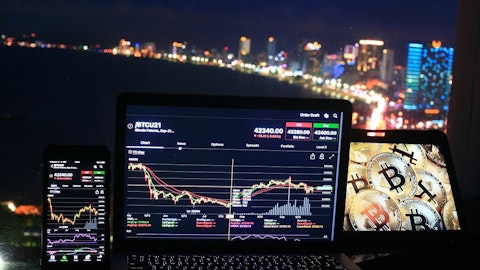Jun-Sup Jung: Hi. Yes. Thank you. I’m Jung Jun-Sup, Securities. Thank you very much for this opportunity. I have two questions. For the first question, as you have already mentioned with regard to CET1. So this year, there are many macro factors that we have to look into, but especially Basel III. I don’t know that it’s going to be most stringent. So with regard to that, what kind of impact do you think it will have on the bank or the financial group? Just some more information on that is my first question. And my second question is, as we refer to the other earnings calls from other groups, in the fourth quarter, we’ve seen a great increase in credit cost, there could be many reasons behind that. And depending on the group I know that in terms of capabilities to manage risk, it may differ, but you can see that for our credit costs and corporate activity, it increased versus previous quarter, but it wasn’t a great jump.
So in the future, with regard to provisioning, I would like to go and ask for your reference on the outlook for provisioning?
Jung Seok-Yong : Yeah. I am Jung Seok-Young, in charge of risk. So let me first answer your first question with regard to the Basel III, the credit risk cost that would be introduced and what kind of impact that will have on our capital. So as of the end of January, or as of the end of December, we’ve looked into this tentatively. And as for the bank, it will be a 30 to 40 BP improvement effect. And in this financial holding, it will be 10 to 20 BP improvement effect. But of course, in the first quarter, we will have to go into the calculation once again. But tentatively speaking, unlike other groups, based on Basel III standards, our capital ratio, we think will improve And the second question has to do with credit costs for provisioning.
Is that correct? So with regard to provisioning, as of last year, in the case of last year, in consideration of the future economic outlook and whether we can actually absorb vender losses what we wanted to do was strengthen our management. So it was about KRW270 billion that we have added in provisioning for the group, and it will be, as was mentioned in the earnings call, it would be about a 20 BP increase in the CCR and the 25 BP in total last year. But this year, as you all know, with the rate hikes, it had an impact on retail, SOHO and also for SMEs and it is to have an impact going forward. So that may lead to a sluggish economy and then it would, of course, exacerbate the earnings for companies, and we believe that it would be about 25 BP of credit cost that would have to increase due to the economic conditions.
Thank you.
Operator: The next question we will take is from Hanwha Securities, Kim Do Ha from Hanwha Securities. Please go ahead.
Kim Do Ha: Yes. Thank you for the opportunity to ask question. I would like to ask an additional question about your capital plan. So on CET1, you did break it down into three different areas. And so I think that you’re saying that the break is about 10% to 12% or above 12% and then when it’s under then 10.5%. So with regards to the possibility of being under 10.5%? I do think that, that could also be a situation that may take place going forward because if you do acquire security arm and it’s a very attractive asset. And I do think that there could also be an issue that there could be a temporary fall under 10.5%. Of course, I don’t believe that, that would be an issue. But if it does follow under 10.5%, what happens to your capital management plan?



